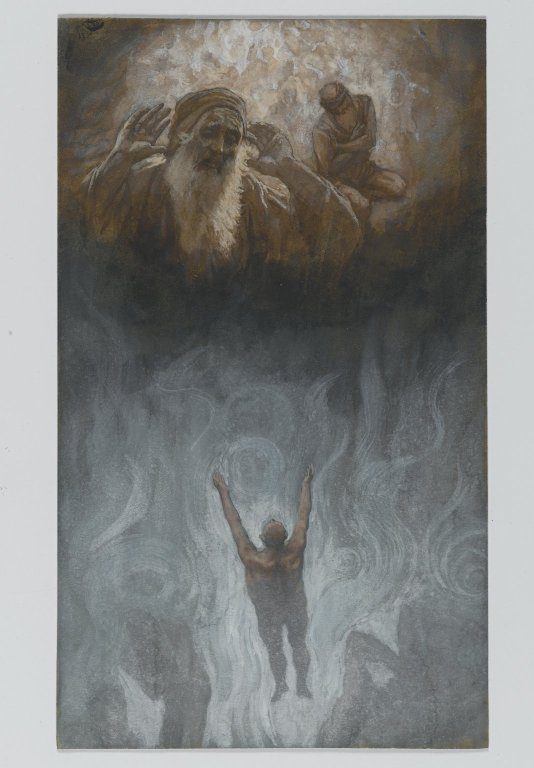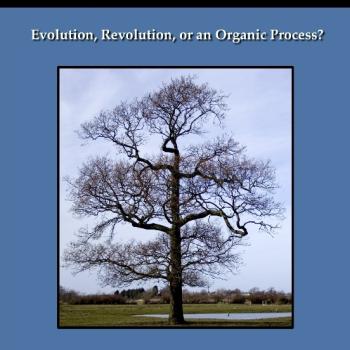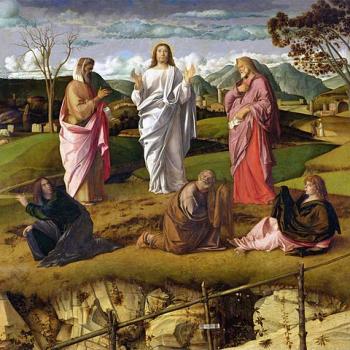
Why do Catholics “pray to saints”? Is this “worship”? Does it imply that departed saints have “godlike” powers? These are some of the questions dealt with in a friendly dialogue with two Protestant friends, on my Facebook page. Bethany Kerr’s words will be in blue; Mike Grubb’s in green.
***
It doesn’t bother me to have beautiful artwork depicting biblical figures (or even Christ). It’s just hard for me to understand what seems to be the cognitive dissonance of people who pray to such artwork and expecting the person represented by the artwork to hear and possibly even answer the prayer and answer it, but simultaneously say that this is not actually prayer or worship because of the distinction between ordinary worship and divine worship… and I can never understand what that distinction truly is. If you pray to and expect that entity to be able to not only hear your prayer, but simultaneously the prayers of people around the world, and also expect that they can grant your prayer, even if you believe it is because God gave them the power to grant you that prayer request, then they are being treated as a lesser god, as far as I can see it.
Well, I’ve written about why we believe as we do. It seems perfectly biblical to me:
Dialogue: “Why pray to a saint rather than to God?”
Why Pray to Saints Rather than God? (The Biblical Rationale)
Biblical Evidence for Veneration of Saints
Venerating & Bowing Before Angels & Men: Biblical?
There is a difference in asking someone here on earth to pray for us and someone in heaven. When we pray to someone in heaven, we are assigning qualities to them that are godlike. Only a god could hear the prayers of many people simultaneously. A person on earth that you ask to pray for you cannot grant your prayers nor can they hear multiple people petitioning them at the same time.
1. All prayers are granted (or refused) by God’s power and grace. That doesn’t change because someone is in the afterlife. We’re not making anyone “godlike” if we’re not claiming that they have the power to grant prayer requests. They intercede, just as every person on earth does, who prays for someone else.
2. Jesus said that those who had died were more alive than we are. We know from passages in Revelation and from Hebrews 12:1 that they take an active interest in the activities and people on earth. We know from James 5 that the prayers of a righteous person have great power. And we know that there is no sin allowed in heaven, so those there are very righteous: without sin, actually. The question, then, becomes, why wouldn’t we take such an opportunity to obtain prayer requests, with such power available? The only “reason” is irrational, unwarranted Protestant tradition, not the Bible or Catholic apostolic tradition, developed for 2000 years.
3. As for simultaneous prayers, all that requires is to be outside of time. It’s quite reasonable to assume that those in heaven are outside of time, as they have begun eternity. Eternity is not “time x infinite duration.” It’s something entirely other. It’s the absence of quantifiable time. That doesn’t make them godlike. It just means that they have an attribute granted them by God, as part of the afterlife in heaven. God was never in time; they once were. That’s the difference. It’s like the difference between a line and a ray in geometry.
I’m not 100 percent sure that I agree that the afterlife is outside of time. As for the other points, I understand your point of view, I really do, but I feel that there simply isn’t enough evidence to lead me to the conclusion that it would not be idolatrous for me to pray to anyone besides God. However, you will be happy to know that I have been giving consideration to the idea that people are able to still have another chance after death, based on the passage that talks about Jesus preaching to the people in Noah’s day who had been disobedient. And it’s certainly an uplifting thought, isn’t it. I think it makes much more sense.
When we say “pray to saints” it means, of course, “asking saints to intercede.” Protestants assume, “one can only pray to God” and so immediately you guys think that what we do is idolatry.
It doesn’t follow at all. They’re still alive; we ask for their intercession: just as Lazarus prayed to Abraham who was 1) a person, and 2) dead. That was taught by Jesus (without any trace of condemnation) in His story of Lazarus and the rich man (Luke 16), which many Protestant commentators agree is not a parable. In KJV it even says, “I pray thee.”
“Another chance” after death is heretical and unbiblical, by both Catholic and Protestant standards. We’re judged after death. Our purgatory is not a “second chance.” All in purgatory are saved. They are simply being cleansed, in order to be fit for heaven.
We’re judged by what we know, and God takes that into account. Paul makes this clear in Romans 2. God knows our hearts, and in His omniscience (middle knowledge) He knows what we would do if we heard things about the gospel and Christianity that we have not heard.
I actually do believe the story of the rich man and Lazarus is a parable.
Parables don’t have proper names. If I’m mistaken on that, please provide an example of one.
Otherwise that would mean that we are tortured in hell before the judgment. But I have been wrong on many things, so I don’t know.
Even if not a parable, he wasn’t praying in the same sense. “I pray thee” would be the same as saying, “I’m asking you”, and he is speaking directly to a person in the same dimension that he is in, can can see with his eyes. He is begging for pity to the person he sees. I really think it’s stretching to say this means we can pray to other humans and expect them to hear and answer our prayers.
Luke 16 is not about hell, but about Hades, or Sheol: which was the abode of the dead before the resurrection of Christ. It is called Hades in many modern translations (e.g., RSV, NIV, NAB) in 16:23 . The story talks about a “great chasm” (16:26, because that is the divide between the damned and the saved in Hades.
It’s a prayer, in the form of a petition: asking Abraham to intercede for two requests. Abraham says no, but that doesn’t disprove that it was a prayer, since God, too, turns down all prayer requests not in His will.
It’s no more relevant that they are both dead than it is that two people are both alive on earth when one asks another to intercede. What the passage decisively refutes is the notion that 1) a dead man can’t be prayed to (i.e., asked to intercede), and 2) no one can be prayed to (petitioned) except God.
Can I ask you what your opinion is on what was actually wrong with Saul asking the dead Samuel for answers since he was just talking to him in the same manner the rich man was in the parable?
If it truly is permissible to speak to those in the afterlife, in the way of the rich man and Lazarus, then there really would have been no sin in conjuring Samuel up to ask him questions. But there is clearly a difference.
Saul was in sin because he sought a medium / witch to communicate with the dead, which was occultic practice / sorcery / necromancy: forbidden to the Jews (and which Catholicism agrees with Protestants, is grave sin). But the real Samuel took the opportunity to appear and prophesy Samuel’s death the next day. That’s rather odd, isn’t it: if God wants no communication whatever with dead saints. It wasn’t a demon, because demons lie, and Samuel told him the truth, which came to pass the next day. See:
Is Invocation of the Saints Equivalent to Necromancy?
Samuel Appearing to Saul: Argument for Communion of Saints?
As for my comment about another chance, maybe I misspoke. What I intended to communicate is that the scripture says that Jesus went to preach to the spirits “in prison”, the very ones who had been disobedient in the days of Noah. I can only speculate that his message was the gospel, and that he was sharing it with them after they died, because they had not had a chance to accept or reject the gospel until then. What are your thoughts, because I am not completely clear on it at this point and probably never really will be.
The spirits in prison that Jesus preached to were in this same place described in Luke 16: Hades / Sheol or what has also been called “the limbo of the fathers.” He announced to them the Good News of His sacrificial death, atonement, redemption, and Resurrection.
Many are confused about these various states in the afterlife (you’re not the only one). I wrote about it here:
Did Jesus Descend to Hell, Sheol, or Paradise After His Death?
Dialogue on Sheol / Hades & the Rich Man and Lazarus
Dave, you said, “They are simply being cleansed, in order to be fit for heaven.” From what are they being cleansed? Didn’t Jesus pay for ALL of our sins? And it can’t be sins between my last confession and the time I died, because those sins fall under the “ALL” category. Colossians 2:13b-14a says, “He forgave us all our sins,…He took it away nailing it to the cross.” All of a believer’s sins have already been forgiven and nailed to the cross. There is no further cleansing needed.
Yes, of course, Jesus paid for all our sins. Protestants still believe in sanctification, even though it has nothing to do with salvation. We believe that purgatory continues this process after death, even though everyone in purgatory is already saved.
We both agree that no sin is allowed in heaven, and we agree that everyone is a sinner (original sin). So something has to happen before we get to heaven. Either it is instantaneous (your view) or there is a process involved (our view). It’s really not all that different.
For biblical rationales for purgatory (of which there are many), see:
50 Bible Passages on Purgatory & Analogous Processes
25 Bible Passages Indicating or Suggesting Purgatory
That God allowed Samuel to speak to Saul and prophecy does not necessarily mean that it was condoned by God. God allows a great many evils to exist without His stepping in to stop it.
A true prophet appearing to give a true prophecy is certainly condoned by God. If this were not the case, the text would have condemned it. But I know of no instance where a prophet giving true prophecy was rebuked by God as wrong. My article on Samuel provides many Protestant commentaries who agree that it was truly Samuel, and not some sinful, terrible thing.
As for Jesus preaching to the spirits in prison, what evidence do we have they were already saved? The scripture says they were the ones who were disobedient during the days of Noah. Unless you believe in a universal salvation, maybe? As in, everyone will eventually be saved but they have to go through a process to get there? I’m just trying to see if I understand your point of view.
Yes, it’s true, that Jesus also preached to the damned (1 Pet 3:19-20). But he only “ascended on high [and] led a host of captives” (Eph 4:8) with the saved. They were both in Sheol / Hades together: precisely as in Luke 16. Universalism is a heresy, rejected by the Catholic Church (hence also by me).
As for purgatory cleansing us of our sins- death accomplishes that, doesn’t it? Sown corruptible, raised incorruptible?
As I said to Mike Grubb, Protestants generally believe that we are “zapped” at death and made instantly clean and sinless. We think it is more of a process, because the Bible indicates such processes of cleaning and purging all over the place. The essence is the same.
I would read the articles but I’m trying to juggle my eight children and reply also so I don’t have as much time as I’d like.
I understand the time pressures of raising eight children (and admire you so much for that). These topics are not simple, and require a considerable bit of depth to fully unpack. Hence, I cite my articles because I’ve already done that work, and there is no need for me to write all that out again.
It will simply require more time for you to fully grasp the Catholic positions. Minus that time, you likely won’t. And that’s okay. Nothing is more important than the job of a mother. But I’m just saying that you’re not gonna fully understand it without a bit more reading and seeing how we argue the thing.
I commend you for seeking to understand a contrary viewpoint, even if you’re not convinced by it. Many people never get to that point. They aren’t willing. And many fight against straw men and mistakenly conclude that others teach things that in fact they do not teach.
It’s always a pleasure to talk to you, Bethany.
***
Photo credit: The Bad Rich Man in Hell [i.e., technically, Hades], by James Tissot (1836-1902) [public domain / Wikimedia Commons]
***

















